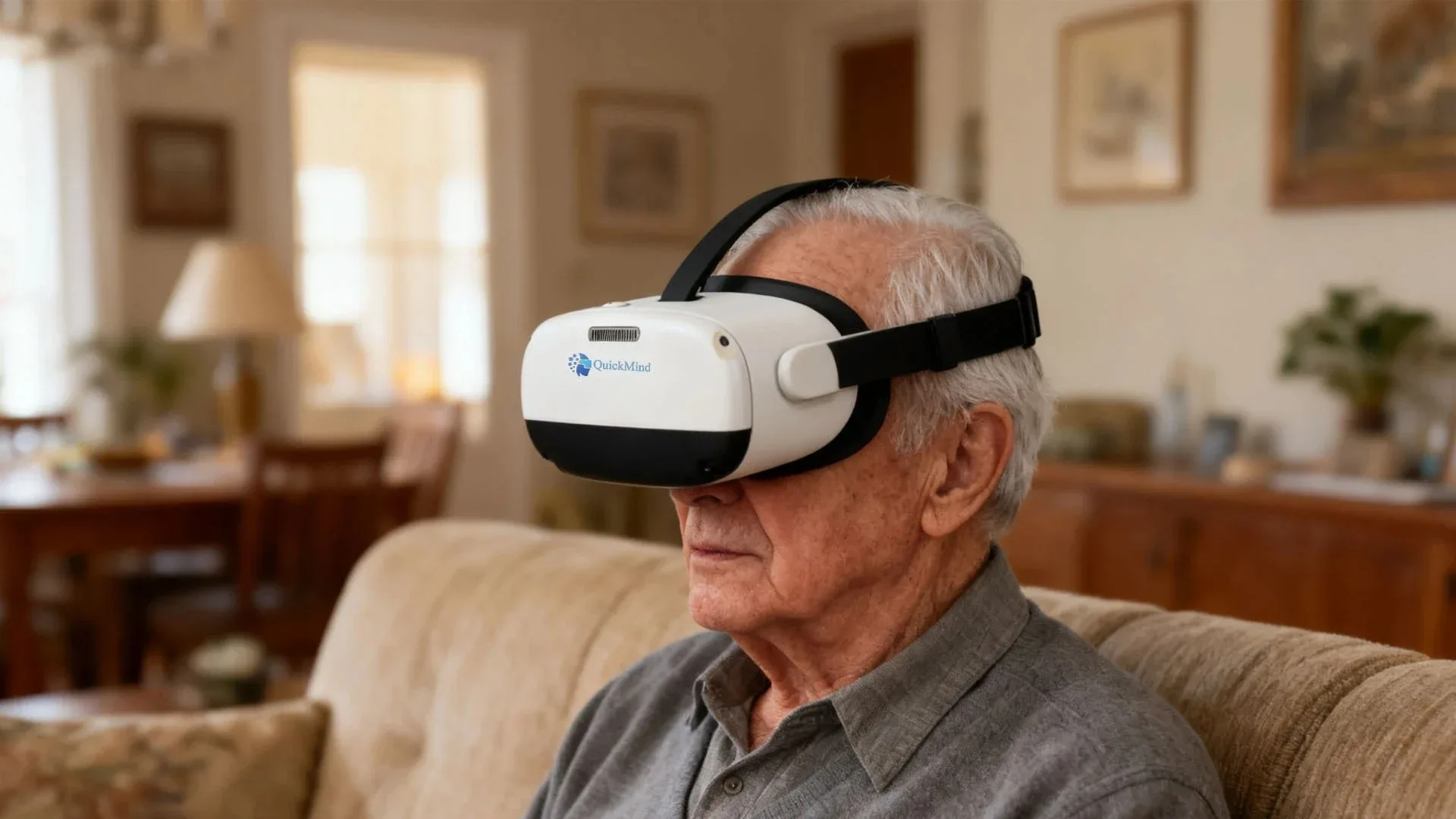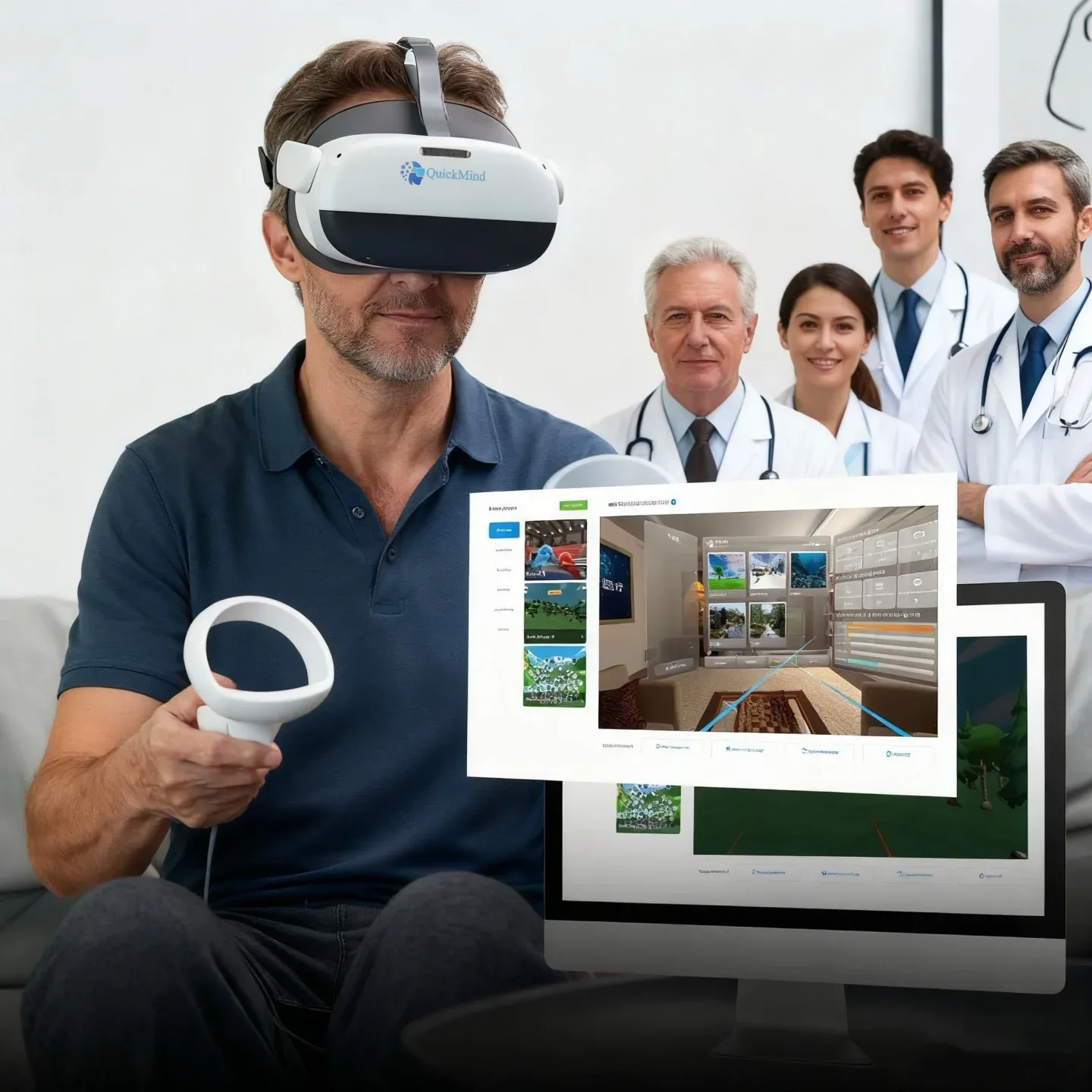
Advancing inquiries confirms that virtual simulation program can greatly boost the health of people suffering from cognitive decline. By transferring them to comforting places, VR delivers a distinctive means for thought encouragement, affective stabilization, and socialization. Several tests have indicated that VR therapy can lessen distress, fear, and sadness in dementia users while also strengthening their mindfulness, heedfulness, and communication skills.
- VR permits persons with dementia to revisit esteemed pasts through dynamic recreations.
- Besides, it can deliver a risk-free and empathetic space for collective interaction, fostering a consciousness of relationship and belonging.
- Researchers propose that VR therapy has the prospect to overhaul dementia therapy by providing new and progressive approaches to address the complicated obstacles faced by subjects experiencing this affliction.
Innovative Tech Treatments for Alzheimer's
Growing technological strategies are demonstrating potential in the field of mental improvement for individuals experiencing neurodegenerative Alzheimer type. These systems employ automated tools to invigorate brain function and likely impede the development of the malady. Game-based routines, personalized guidance, and thought training are some instances of plans being investigated in this changing sector. While evaluations are continuing, digital therapeutics present a additional roadway for augmenting the lives of those living with neurodegenerative Alzheimer type.Novel VR Techniques for Alzheimer's Intervention
Concerning people battling Alzheimer disorder, the slow erosion of memory and mental competence can substantially hamper their capability to engage with the surrounding environment. This devastating disease often results in remoteness, upset, and a decreased individuality. Latest enhancements in virtual reality technology provide a revolutionary prospect to combat these barriers by developing immersive environments that can trigger the brain and strengthen cognitive function.
Simulated reality settings designed specifically for those with Alzheimer's can engulf them in beloved environments, such as their old family house or a chosen recreational spot, awakening positive memories and lowering anxiety. Through interactive assignments, these virtual universes can also boost cognitive abilities like recall, concentration, and logical processing.
The potential benefits of virtual reality in Alzheimer's therapy are manifold. Early evaluations have established favorable results, with participants demonstrating improvements in cognitive skills, mood, and overall quality of life. As this platform moves forward, it holds the key to modifying the way we approach Alzheimer's disease, due a new pathway for intervention and empowerment.
VR-Mediated Reminiscence Therapy for Individuals with Alzheimer's
Reminiscence therapy is a widely recognized technique used to enhance cognitive function and emotional stability in individuals with Alzheimer's disease. This conventional form of therapy involves engaging patients to narrate past experiences, often through dialogue. However, a revolutionary approach is emerging: VR-mediated reminiscence therapy.
This immersive system utilizes virtual reality headsets to transfer patients in convincing environments that invoke memories from their past. By reliving these replicated atmospheres, individuals with Alzheimer's can participate with their past in a influential way.
Virtual Reality as a Memory and Cognitive Booster in Dementia
Virtual reality (VR) is emerging as a up-and-coming tool in the fight against dementia, granting trailblazing ways to engage memory and cognition. By designing immersive simulations, VR can assist individuals with dementia recover memories, associate in meaningful activities, and strengthen cognitive powers. Studies have demonstrated that VR interventions can cause marked improvements in memory recall, attention, and geographical awareness. Moreover, VR provides a secure and uplifting space for individuals with dementia to engage, reducing feelings of isolation and concern.
- Besides, VR can be fitted to individual needs and preferences, helping enhanced levels of interaction.
- Notwithstanding the prospects of VR, ongoing research is needed to fully understand its long-term performance in dementia care.
Memory Restoration and Social Reinforcement through VR in Alzheimer's
Immersive digital experiences is emerging as a revolutionary mechanism in the sector of Alzheimer syndrome. By designing compelling and collaborative atmospheres, VR has the possibility to reignite memories, build social interaction, and augment the overall quality of life for users struggling with Alzheimer's. Among the most powerful aspects of VR is its ability to carry users to beloved locations and adventures from their past. Whether it's a stroll in a childhood home or a reenactment of a beloved holiday, these virtual walkthroughs can recall happy memories and enhance cognitive function. Furthermore, VR can support social interaction by associating individuals with others who share similar interests. This can be particularly advantageous for people with Alzheimer's who may encounter obstacles with traditional social engagement. By providing a safe and captivating virtual space, VR Cognitive Rehabilitation can ease feelings of isolation and loneliness, which are common among users living with Alzheimer's. Overall, VR holds immense capability for remodeling the lives of participants with Alzheimer's by awakening memories, fortifying connections, and boosting their quality of life. As technology persists in develop, we can expect even more imaginative applications of VR in the field of dementia care.Applying Cognitive Training: Harnessing VR for Alzheimer's Therapy
Augmented reality experiences is rapidly emerging as a revolutionary tool in the realm of cognitive training, particularly for individuals living with Alzheimer's disease. By immersing patients in interactive and engaging virtual environments, VR-based interventions can augment cognitive functions such as memory, attention, and problem-solving. These games habitually incorporate elements of storytelling, exploration, and social interaction, making the training process very motivating. Studies have shown that VR-based cognitive training can lead to noticeable improvements in cognitive performance, maybe delaying the progression of Alzheimer's symptoms. Moreover, VR provides a safe and controlled environment for patients to practice new skills and build their confidence.
- Game-enhanced procedures in VR training can make it deeply absorbing and pleasant for persons with mental decline.
- VR simulations can offer believable scenarios that test and activate cognitive functions.
- Personalized VR experiences can cater to individual needs and learning styles.
Using Simulated Worlds to Aid Dementia Care
Alluring VR experiences offer a unique and beneficial avenue for clients facing memory loss. These mechanisms can recreate familiar environments, allowing those affected by cognitive decline to experience cherished memories and encourage a sense of solace. By easing the symptoms of dementia, VR realities have the option to elevate quality of life for both subjects and their advocates.
- Trials indicate that VR uses can positively impact cognitive function, emotional well-being, and even motor abilities in individuals with dementia.
- Moreover, VR provides a safe and controlled environment for exploration, reducing the risk of harm.
- Furthermore, VR can strengthen social links by allowing individuals with dementia to interact in artificial activities with others.
Utilizing Virtual Reality for Early Alzheimer's Identification and Management
Alzheimer's ailment emerges a complicated conundrum, often persisting unseen in its early stages. Yet, virtual reality (VR) is gaining traction as a advanced tool for early discovery. Through immersive scenarios, VR can analyze cognitive capacity in ways that traditional methods fail to. This possibility allows for prompt management strategies, potentially reducing disease progression and enhancing the quality of life for people with Alzheimer's.
- VR cognitive tests measure recall, alertness, and positional skills in safe and regulated spaces.
- Individualized VR environments encourage client participation in brain-boosting activities.
- Digital virtual settings create opportunities for people with Alzheimer's to link and participate.
VR as a Medium for Dementia Engagement and Social Participation
{In the realm of dementia care, innovative technologies are emerging to enhance the lives of persons with neurodegenerative disorders. Virtual reality (VR) is one such system that holds immense prospect for narrowing social gaps and boosting communication with dementia clients through VR. By developing compelling digital realities, VR can activate cognitive function, reduce behavioral issues, and ultimately improve the overall well-being of dementia patients.
VR experiences adapted to dementia patient needs can range from recall therapy sessions that transport participants to cherished memories, to interactive games that promote social interaction and cognitive training. Furthermore, VR has the aptitude to connect persons managing dementia with social groups, regardless of physical barriers, fostering a sense of belonging.
- VR can enable in reducing agitation and anxiety by providing a calming and engrossing environment.
- Analyses have shown that VR interventions can lead to improvements in cognitive function, mood, and social interaction in subjects coping with dementia.
- As technology continues to progress, we can expect even more innovative and {effective|beneficial|helpful|powerful|impactful|successful|productive|efficient
